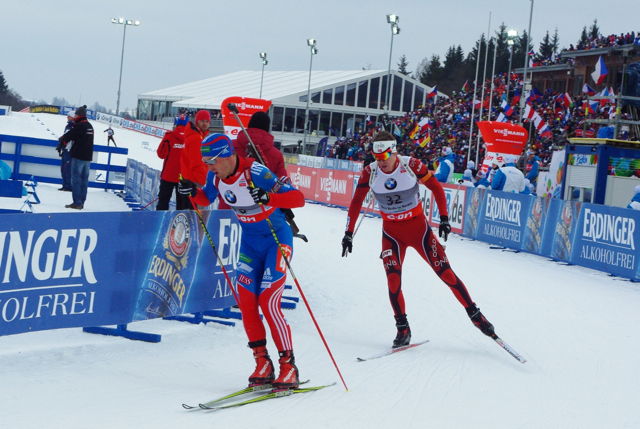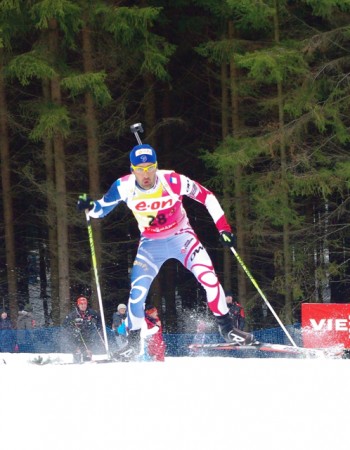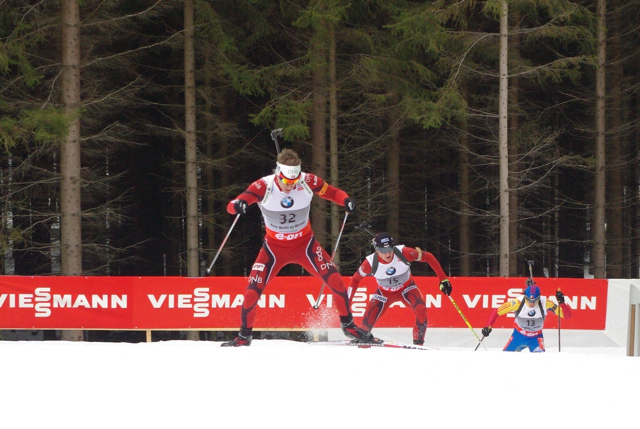
NOVÉ MĚSTO NA MORAVĚ, Czech Republic – Three years ago, Emil Hegle Svendsen of Norway was the king of biathlon.
Then the young guns intervened. First, teammate Tarjei Bø claimed the 2011 crown, along with a string of World Cup and World Championships victories. Then Martin Fourcade of France rose to the top, fighting Svendsen neck and neck all season but dominating the World Championships in Ruhpolding, Germany, where he took three titles.
Svendsen came into this season determined to win his way back, but coming into this World Championships he trailed Fourcade by 62 points, or about one win, in the total score. And speaking of wins, the Norwegian had only collected one of them.
But the Championships started off well for the Norwegian team, as Svendsen held off Fourcade in the mixed relay. In the press conference, he said he was not worried that the Frenchman was chasing him. Then in today’s sprint, Svendsen calmly executed his plan, hit his targets (mostly), and beat Fourcade by 8.1 seconds to win the first individual title awarded here in the Czech Republic.
Still, Svendsen said he wasn’t thinking about any of the history – just going out and doing his job.
“Every race has its own life,” he said in a press conference. “Last year is last year and today is today, so that didn’t have so much to do with it, but I had a goal to do the same as in the mixed relay on the tracks and on the shooting range, and I managed to do that , so I am happy.”
Starting just four bibs apart, the two battled through the 10 k, two-stage race; each cleaned the prone stage, and then missed one shot in standing, earning a penalty loop apiece.

“I think [the penalty] was loss of focus and also part of biathlon,” Fourcade said. “I am a bit disappointed about this target, but Emil did one too, and that is the game, you can’t be perfect all the time. I wasn’t today, but I’m very happy with the place.”
Unlike his Norwegian rival, Fourcade, in typical fashion, did make the race personal. He knew exactly who his biggest competition was likely to be, and wasn’t afraid to talk up the matchup that will happen again in the pursuit tomorrow.
“I expected it,” Fourcade said of Svednsen’s fast skiing. “But I am really happy with what I did, I did almost 100 % of what I could do, and in this kind of race you have to just say congratulations to the better one… and I hope to beat him in the pursuit.”
Svednsen, for his part, said that when he crossed the line he wasn’t sure if he would hang onto the lead. Here at World Championships, racing is organized a bit differently than a t a regular World Cup, with each country receiving one starting position per seed rather than all of the top racers starting together at the front.
“There were almost 100 athletes left on the tracks after I crossed the finish line, so I had no idea if I was going to win,” Svendsen said. “I had a good feeling, but with one mistake you can never be sure. If I had shot clean then maybe I would have been more secure when I crossed the finish line. But today there were really strong athletes in the third and fourth start groups.”
It initially seemed that Fourcade’s teammate Alexis Boeuf would earn the final medal of the day. But the later seeds also made a charge at the podium. First, Dmitry Malyshko of Russia tried to redeem himself after a relay meltdown on Saturday, shooting clean and bumping Boeuf off the podium by just two seconds.
But it didn’t last as Jakov Fak of Slovenia, who won two World Cup races earlier this season, used his own clean sheet to come just as close. Leaving the range after standing, he was in a dead heat with Malyshko, with a split 5.8 seconds behind Svendsen – and five ahead of Fourcade. While he ultimately trailed the Frenchman by three seconds at the finish, he was able to put some time into Malyshko and secure bronze.
“My coaches gave me all the information,” Fak explained in a press conference. “I couldn’t say that I had a great last loop – I lost some time to Martin. But I’m very happy with the bronze medal and I think that every athlete that wins a medal at the World Championships should be very happy because it’s such a strong field. It’s a great achievement for me.”
Fak was the World Champion in the individual race last year, and said that he had believed that format was once again his best hope for a medal. After the mixed relay, he hadn’t been feeling so good on his skis – and he knew that the field would be “killing themselves” to win the sprint. With a few more days to recover, the individual seemed like a better shot.
But he ended up feeling better on his skis today – still not perhaps himself, as he can often make up for errors on the range with fast skiing, whereas today his bronze came despite better shooting than Svendsen and Fourcade – and earned the medal after all. That takes some of the pressure off after a disappointing mixed relay, where the Slovenians were unable to repeat their medal from last year and finished fifth.
“We won a medal last year, and we wanted to get the pressure off the whole team but it didn’t work out so good,” Fak said. “Before the World Championships I wanted to win a medal but I didn’t expect it in the sprint. But today I felt good, especially on the shooting range, and I was able to get the third place.”
The snow on the course broke down somewhat over the course of the 132 starters, and Fak said that he was at a slight disadvantage starting 20 bibs behind Fourcade, although he didn’t go so far as to say it kept him from a silver medal. The uphills were fine, he said – they held up better than they had in the mixed relay – but the downhill corners got deep, which slowed him down.
Ole Einar Bjørndalen of Norway, starting a few bibs behind Fak, notched his best result of the season, coming in fourth despite a penalty in standing. The aging superstar had appeared to be out of sorts and finally no longer a factor in races earlier this season, but his skiing today served as a reminder that not only is he still earning starts, he’s very much a threat.
“The sprint was my favorite distance before,” he had told Norwegian broadcaster NRK before the race. “I really want to fight back and show that I can assert myself there again… but I don’t know how good of shape I’m in.”
As it turns out, pretty good shape: his ski time was the fourth-fastest of the day. He led after the prone stage, but dropped to fifth with his penalty in standing. Nevertheless, he was able to beat Malyshko on the last loop.
Boeuf held on to sixth, followed by Anton Shipulin of Russia and Fredrik Lindström of Sweden; Evgeniy Ustyugov of Russia and Simon Eder of Austria rounded out the top ten.
Tomorrow’s pursuit is shaping up to be exciting, as Fourcade said that he planned to make up the eight seconds on Svendsen so that he could take the first shot of the race. Fak, meanwhile, said that he hoped to ski down the three seconds to the Frenchman and ski together with him as well. Each man has won a pursuit so far this season.
And in the battle for the World Cup title, Fourcade is still ahead. While Svendsen earned 60 points for his win, second place is worth 54, so he only crept a bit closer to the lead. To cut further into the deficit, he’ll have to win more. In the press conference, Svendsen was asked if he could imagine doing just that.
“How many more [golds] can I imagine?” he laughed. “I can imagine four more, but I don’t think that is realistic. I have a goal to be on the podium more times this World Championships, but still it’s a lot of work to do. I’m very happy now that I have reached my goal, and I’m just going to have fun for the rest of the time here.”

Chelsea Little
Chelsea Little is FasterSkier's Editor-At-Large. A former racer at Ford Sayre, Dartmouth College and the Craftsbury Green Racing Project, she is a PhD candidate in aquatic ecology in the @Altermatt_lab at Eawag, the Swiss Federal Institute of Aquatic Science and Technology in Zurich, Switzerland. You can follow her on twitter @ChelskiLittle.



